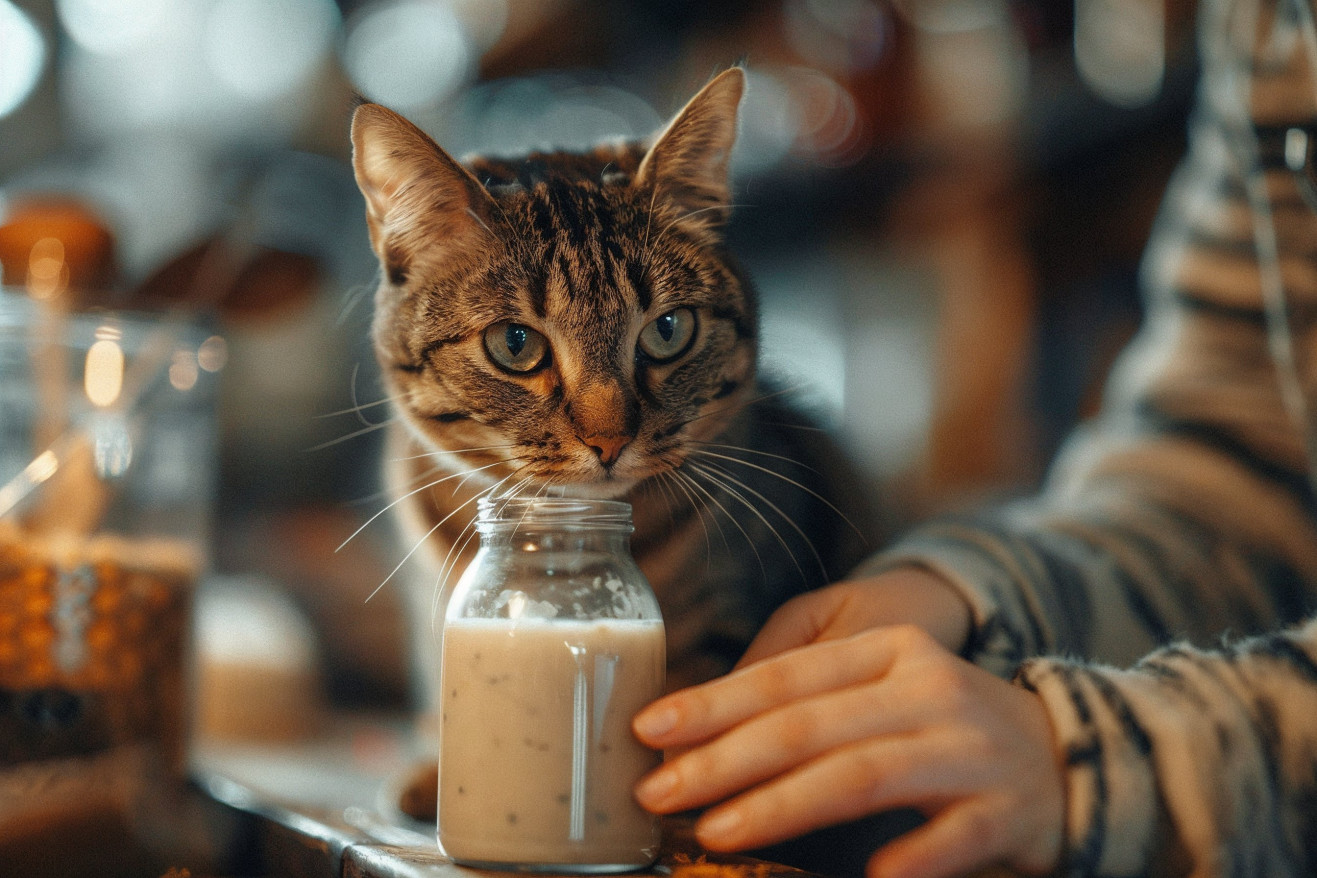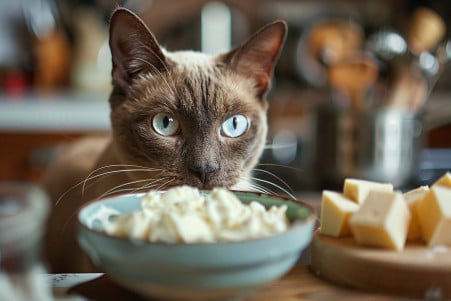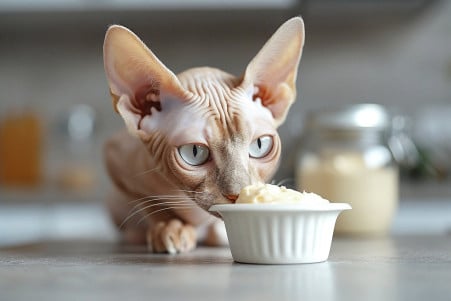Can Cats Eat Ranch Dressing? Risks and Benefits Explained
22 April 2024 • Updated 22 April 2024

If you've ever been tempted to let your cat have a taste of your ranch dressing, it's important to know the risks and benefits of giving your cat this popular condiment. Cats can have a little bit of plain, full-fat ranch dressing as an occasional treat. However, ranch dressing is high in fat and contains dairy, so it should be fed to cats in moderation and not be a regular part of their diet, as it can lead to gastrointestinal upset, obesity, and other problems if it's consumed in larger amounts.
In this article, we'll discuss what the experts have to say about this topic, including information from veterinarians and other cat care professionals that will help you understand how to safely feed your cat foods like ranch. We'll also cover the nutritional content of ranch dressing, how much is too much for cats, and which ingredients in ranch dressing could be harmful or even helpful to your cat's health. By the time you're done, you'll know whether ranch dressing can be an occasional treat for your cat or if you should avoid giving it to them altogether.
Can cats eat ranch dressing?
Cats and Dairy: Lactose Intolerance Explained
Most adult cats are lactose intolerant, which means they lack the enzyme lactase needed to break down the lactose in dairy products like ranch dressing. According to Vets Now, a kitten's body produces lactase to help them break down their mother's milk, but after weaning, the production of this enzyme slows, causing lactose intolerance in most adult cats.
Lactose intolerance in cats can cause digestive problems like diarrhea, vomiting, and gas. Wellbeloved explains that while a small amount of cheese may not cause an immediate problem for a cat, the lactose and other ingredients like onions and garlic can cause an upset stomach. Even cheeses with lower lactose levels, such as blue cheese and cheddar, should be avoided or given in very small amounts.
While kittens can tolerate lactose better than adult cats, the high fat and salt content of dairy products can still be problematic, according to Optimeal. Even if a small amount of dairy doesn't cause an immediate problem for some cats, regular consumption can lead to long-term issues like obesity, dehydration, and imbalances in essential nutrients. Since the dairy in ranch dressing is the primary concern, it's best to avoid giving this condiment to cats to prevent potential digestive upset and other health problems.
Ranch Dressing Contains Toxic Ingredients That Can Harm Cats
Ranch dressing is made with several ingredients that are toxic to cats, including garlic, onions, and chives. As Hepper points out, onions, including onion powder, can lead to anemia in cats. Meanwhile, the Pet Keen article notes that onions, garlic, and chives are all part of the Allium family, which can cause a cat's heart muscles to relax and blood vessels to dilate, which can lead to circulatory issues and low blood pressure.
Consuming these toxic ingredients can lead to a range of health problems, including anemia, digestive issues, and blood sugar abnormalities in cats, and even small amounts of these ingredients can be harmful, so ranch dressing is not a safe treat for cats. As a result, as Pets Paradise Hub observes, other common ranch dressing ingredients, including herbs and spices, can also cause gastrointestinal issues or other negative reactions in cats. This is why it's important to know the potential risks and avoid giving cats any foods that contain ingredients that are toxic to them.
Healthy Alternatives to Cat Treats
Even though cats can't have ranch dressing, there are plenty of other human foods that cats can eat. According to Purina, cooked, unseasoned meats and fish like chicken, turkey, and salmon can be a good source of essential nutrients and protein. BeChewy also says that plain, low-fat dairy products like yogurt or hard cheeses can be given to cats in small amounts. Fruits and vegetables like bananas, blueberries, and cooked sweet potatoes can also be given to cats as treats to provide them with vitamins and minerals, according to Pawlicy Advisor. Of course, there are also plenty of commercial cat treats that are specifically designed to meet a cat's nutritional needs.
By offering these alternatives, you can give your cat the treats they crave while also making sure that you're looking out for their health. That said, make sure to talk to your vet about how much of these treats you should give your cat and how often. This is especially important if you're introducing a new food into your cat's diet.
How to Tell If Your Cat Has Been Poisoned and What to Do
If your cat eats ranch dressing, or any other toxic substance, it is important to know how to tell if your cat has been poisoned and what to do. According to VCA Animal Hospitals, signs of poisoning in cats include vomiting, diarrhea, lethargy, seizures, and difficulty breathing.
If you think your cat has been poisoned, Citrus County Vets advises that you call your vet or an animal poison control center right away. Be prepared to tell them exactly what your cat ate and how much they ate, as this will help them diagnose and treat your cat.
According to Pet Poison Helpline, the sooner your cat gets medical attention, the better their chances of recovery. Waiting to get help can lead to more serious issues or even death. By knowing how to tell if your cat has been poisoned and getting them help right away, you can make sure that your cat stays safe and healthy.
Ranch Powder Mix: Can Cats Eat It?
While ranch powder mix doesn’t have the same liquid consistency as ranch dressing, it’s still not a safe option for cats. According to Pets Paradise Hub, many ranch powder mixes contain garlic, onions, and a variety of herbs, all of which are toxic to cats.
In addition to the potential for garlic and onion poisoning, the high sodium levels in ranch powder mix and the potential for lactose intolerance issues make it a poor choice for cats, notes Animal Gator. While a small amount of ranch powder mix may not cause any immediate problems, if your cat eats it regularly, it could lead to a number of health issues.
In general, it’s best to avoid giving cats ranch seasoning or dressing in any form. There are plenty of other treats that are safer and more nutritious for cats to eat. As Catster points out, most human foods, including ranch, don’t offer cats any nutritional benefits and could be harmful to them.
Conclusion: Making Your Cat's Health and Well-Being a Priority
While the dairy in ranch dressing may be the reason cats are attracted to it, it's definitely not safe or healthy for them to eat. According to Hepper, cats should not be given ranch dressing, even in small amounts, because it can be dangerous to them.
Most ranch dressing recipes include ingredients that are toxic to cats, such as garlic and onions. Ingesting onions, whether in whole or powdered form, can lead to anemia in cats. Meanwhile, as Frontier Vet notes, garlic can cause the red blood cells in a cat's body to be destroyed after it's ingested, which can have serious health effects.
In addition to these concerns, it's important to remember that most cats are lactose intolerant, and ranch dressing is loaded with lactose from buttermilk, sour cream, and mayonnaise. According to WebMD Pets, if a cat consumes ranch dressing, they may experience short-term issues like gas and diarrhea.
On top of the toxicity and lactose issues, ranch dressing is also high in oil, salt, sugar, and even MSG, all of which are bad for cats. The sugar could lead to blood sugar problems, while the MSG could affect a cat's appetite and cause them to lose interest in eating when it's time for a meal.
As a result, it's best to avoid letting your cat have even a taste of ranch dressing whenever possible. The potential downsides are just too great, and there are plenty of other treats that are safer and more nutritious that you can give your cat.


